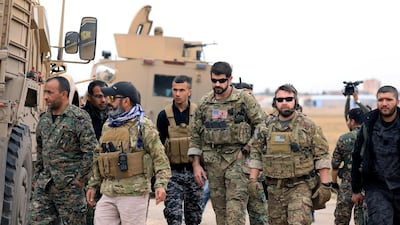US President Donald Trump confirmed on Wednesday that he would be leaving behind 400 of the 2,000 troops currently in Syria, only three months after he said he would pull them all out.
“We are going to leave 200 people there and 200 people in another place in Syria, closer to Israel, for a period of time,” Mr Trump said on Wednesday.
“Closer to Israel” implies the Tanf area where the US has a base. It is considered a crucial border location to block Iran's access to Syria.
During King Abdullah of Jordan’s visit to Washington two weeks ago, US officials discussed a residual force in Tanf, near Jordan’s border.
Mr Trump also said ISIS would be defeated by Wednesday evening. Displaying a map of ISIS's remaining territory, he pointed to a “tiny spot which will be gone by tonight".
Syrian Democratic Forces are fighting the last battle against ISIS in the village of Baghouz.
But US military commanders have warned that retaking all of the extremists' territory does not mean they are defeated, saying the fight “is far from over.”
The Wall Street Journal reported on Sunday that the US would leave up to 1,000 troops in Syria, but US military commanders denied the report.
“The US President bowed to pressure from those around him but more importantly he’s now backing a policy that’s wholly unsustainable,” said Charles Lister of the Middle East Institute, on the decision to leave 400 troops.
“The idea of keeping 200 troops spread throughout 33 per cent of Syria on a ‘hold and support’ mission is a joke."
Mr Lister said that until now, Mr Trump agreed to 400 troops on the condition that US allies, mainly the UK and France, would provide assistance.
"But there is no appetite in Paris, London or elsewhere to fulfil that demand,” he said.
The French Minister of Defence, Florence Parly, held talks in Washington this week, but no agreement was reached on troop levels in Syria.
“This doesn’t add up to a policy or strategy, it’s a temporary stopgap lacking any logical foundation,” Mr Lister said.
He also cautioned against underplaying the ISIS threat after its territorial defeat.
“The ISIS threat remains very real and the challenge we face now is arguably more complex than the one we’ve confronted until now.”
Sole survivors
- Cecelia Crocker was on board Northwest Airlines Flight 255 in 1987 when it crashed in Detroit, killing 154 people, including her parents and brother. The plane had hit a light pole on take off
- George Lamson Jr, from Minnesota, was on a Galaxy Airlines flight that crashed in Reno in 1985, killing 68 people. His entire seat was launched out of the plane
- Bahia Bakari, then 12, survived when a Yemenia Airways flight crashed near the Comoros in 2009, killing 152. She was found clinging to wreckage after floating in the ocean for 13 hours.
- Jim Polehinke was the co-pilot and sole survivor of a 2006 Comair flight that crashed in Lexington, Kentucky, killing 49.
The biog
Born November 11, 1948
Education: BA, English Language and Literature, Cairo University
Family: Four brothers, seven sisters, two daughters, 42 and 39, two sons, 43 and 35, and 15 grandchildren
Hobbies: Reading and traveling
Company Fact Box
Company name/date started: Abwaab Technologies / September 2019
Founders: Hamdi Tabbaa, co-founder and CEO. Hussein Alsarabi, co-founder and CTO
Based: Amman, Jordan
Sector: Education Technology
Size (employees/revenue): Total team size: 65. Full-time employees: 25. Revenue undisclosed
Stage: early-stage startup
Investors: Adam Tech Ventures, Endure Capital, Equitrust, the World Bank-backed Innovative Startups SMEs Fund, a London investment fund, a number of former and current executives from Uber and Netflix, among others.
SPEC%20SHEET
%3Cp%3E%3Cstrong%3EProcessor%3A%3C%2Fstrong%3E%20Apple%20M2%2C%208-core%20GPU%2C%2010-core%20CPU%2C%2016-core%20Neural%20Engine%3C%2Fp%3E%0A%3Cp%3E%3Cstrong%3EDisplay%3A%3C%2Fstrong%3E%2013.3-inch%20Retina%2C%202560%20x%201600%2C%20227ppi%2C%20500%20nits%2C%20True%20Tone%2C%20wide%20colour%3C%2Fp%3E%0A%3Cp%3E%3Cstrong%3EMemory%3A%3C%2Fstrong%3E%208%2F16%2F24GB%3C%2Fp%3E%0A%3Cp%3E%3Cstrong%3EStorage%3A%3C%2Fstrong%3E%20256%2F512GB%20%2F%201%2F2TB%3C%2Fp%3E%0A%3Cp%3E%3Cstrong%3EI%2FO%3A%3C%2Fstrong%3E%20Thunderbolt%203%20(2)%2C%203.5mm%20audio%3B%20Touch%20Bar%20with%20Touch%20ID%3C%2Fp%3E%0A%3Cp%3E%3Cstrong%3EConnectivity%3A%3C%2Fstrong%3E%20Wi-Fi%206%2C%20Bluetooth%205.0%3C%2Fp%3E%0A%3Cp%3E%3Cstrong%3EBattery%3A%3C%2Fstrong%3E%2058.2Wh%20lithium-polymer%2C%20up%20to%2020%20hours%3C%2Fp%3E%0A%3Cp%3E%3Cstrong%3ECamera%3A%3C%2Fstrong%3E%20720p%20FaceTime%20HD%3C%2Fp%3E%0A%3Cp%3E%3Cstrong%3EVideo%3A%3C%2Fstrong%3E%20Support%20for%20HDR%20with%20Dolby%20Vision%2C%20HDR10%2C%20ProRes%3C%2Fp%3E%0A%3Cp%3E%3Cstrong%3EAudio%3A%3C%2Fstrong%3E%20Stereo%20speakers%20with%20HDR%2C%20wide%20stereo%2C%20Spatial%20Audio%20support%2C%20Dolby%20support%3C%2Fp%3E%0A%3Cp%3E%3Cstrong%3EIn%20the%20box%3A%3C%2Fstrong%3E%20MacBook%20Pro%2C%2067W%20power%20adapter%2C%20USB-C%20cable%3C%2Fp%3E%0A%3Cp%3E%3Cstrong%3EPrice%3A%3C%2Fstrong%3E%20From%20Dh5%2C499%3C%2Fp%3E%0A
Fixtures
%3Cp%3E%3Cstrong%3EWednesday%2C%20April%203%3C%2Fstrong%3E%3C%2Fp%3E%0A%3Cp%3EArsenal%20v%20Luton%20Town%2C%2010.30pm%20(UAE)%3C%2Fp%3E%0A%3Cp%3EManchester%20City%20v%20Aston%20Villa%2C%2011.15pm%20(UAE)%3C%2Fp%3E%0A%3Cp%3E%3Cstrong%3EThursday%2C%20April%204%3C%2Fstrong%3E%3C%2Fp%3E%0A%3Cp%3ELiverpool%20v%20Sheffield%20United%2C%2010.30pm%20(UAE)%3C%2Fp%3E%0A
UAE currency: the story behind the money in your pockets
UAE currency: the story behind the money in your pockets

